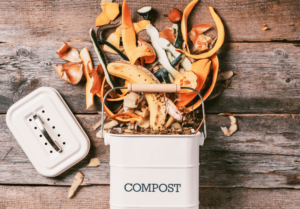Vermicomposting, the process of utilizing worms to decompose organic waste, brings forth a myriad of benefits, making it an eco-friendly and sustainable solution for managing kitchen scraps and green waste. Let’s explore the numerous advantages of vermicomposting:
- Nutrient-Rich Fertilizer:
- Benefit: Vermicompost, often referred to as “black gold,” is a nutrient-dense organic fertilizer. It contains essential nutrients like nitrogen, phosphorus, potassium, and micronutrients, providing a well-rounded boost for plant growth.
- Improved Soil Structure:
- Benefit: Adding vermicompost to soil enhances its structure by improving water retention and aeration. It creates a crumbly, friable texture, promoting healthier root development and overall plant vitality.
- Microbial Activity Boost:
- Benefit: Vermicompost is teeming with beneficial microorganisms. These microbes contribute to the soil’s biological activity, aiding in nutrient cycling and creating a thriving environment for plants.
- Reduced Greenhouse Gas Emissions:
- Benefit: By diverting organic waste from landfills, where it would produce methane, vermicomposting helps in reducing greenhouse gas emissions. The process itself is aerobic, minimizing the environmental impact.
- Waste Reduction:
- Benefit: Vermicomposting allows for the efficient decomposition of kitchen scraps, cardboard, and other organic materials. This helps reduce the volume of waste sent to landfills, contributing to a more sustainable waste management system.
- Natural Pest Control:
- Benefit: The presence of worms in vermicompost systems helps control pest populations. Worms consume certain pests and inhibit the growth of harmful pathogens, creating a balanced and pest-resistant environment.
- Odor-Free Process:
- Benefit: Properly managed vermicompost systems are virtually odor-free. Unlike traditional composting methods that may produce unpleasant smells, vermicomposting is well-suited for indoor and small-space use.
- Cost Savings for Gardeners:
- Benefit: Vermicompost eliminates the need for chemical fertilizers. By using this nutrient-rich organic fertilizer, gardeners can save money while promoting sustainable and eco-friendly gardening practices.
- Easy and Scalable:
- Benefit: Vermicomposting is adaptable to various settings. Whether you have a small apartment balcony or a backyard garden, you can set up a vermicompost bin to suit your space and needs. It’s a user-friendly and scalable solution.
- Educational Value:
- Benefit: Vermicomposting is an educational and engaging activity for schools, households, and community gardens. It offers insights into the natural cycles of decomposition, soil health, and environmental stewardship.
- Community Building:
- Benefit: Shared vermicomposting initiatives can foster a sense of community. Participating in collective composting projects can bring people together with a shared commitment to sustainability.
In conclusion, vermicomposting is more than just a waste management solution; it’s a sustainable practice that enriches soil, nurtures plant life, and contributes to a healthier planet. By harnessing the power of worms, individuals and communities can actively participate in the cycle of regeneration, turning kitchen scraps into a valuable resource for the garden.

